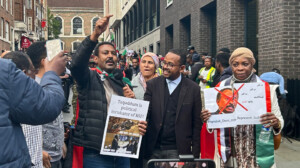Protests against Sudanese security forces brutality
Yesterday, demonstrators closed the Manshiya Bridge between Khartoum and Khartoum North to denounce the killing of a demonstrator and the use of force against of the thousands of demonstrators.
 Protestors block El Manshiya bridge linking Khartoum with Khartoum North on October 22 (Social media)
Protestors block El Manshiya bridge linking Khartoum with Khartoum North on October 22 (Social media)
Yesterday, demonstrators closed the Manshiya Bridge between Khartoum and Khartoum North to denounce the killing of a demonstrator and the use of force against of the thousands of demonstrators.
Government forces used tear gas excessively, to disperse the crowd and re-open the bridge. The demonstration continued until Thursday night, following the death of a young man and the injury of 14 others on Wednesday.
The Resistance Committees of El Jereif East and El Barari announced the escalation of protests until the names of the killers of demonstrator Mohamed Abdelmajeed are announced, in addition to the force commander.
Several political parties condemned the excessive violence on Wednesday.
The Communist Party of Sudan holds the governor of Khartoum and his security committee responsible for the use of violence, demanding the governor to submit his resignation and appear before the judiciary. They also called for dissolution of the state security committee.
The Sudanese Congress Party holds the regular forces fully responsible for all violations. The violence “confirms the necessity to immediately reform the government forces and review the professional performance of their members,” said the party in a statement yesterday.
El Sadig El Mahdi, president of the National Umma Party called for an independent committee to investigate the events of the Marches of the Millions of October 21 and legal accountability of the parties concerned.
El Mahdi highlighted the right to demonstrate. He explained that the overthrow of the government from the street is possible in the face of dictatorial epochs, but “confronting institutions of government and calling for their replacement during democratic rule should be realised through legitimate institutions established by the revolution.”
Prime Minister Abdallah Hamdok has offered his condolences to the family of Abdelmajeed.
On Thursday, Hamdok said in press statement that achieving justice is one of the requirements for the stability of the democratic transition in the country. “The government will continue to push for the comprehensive reform agenda for state institutions in the context of the post-peace agreement.” Hamdok stressed the need for transparency and speed.
Radio Dabanga’s editorial independence means that we can continue to provide factual updates about political developments to Sudanese and international actors, educate people about how to avoid outbreaks of infectious diseases, and provide a window to the world for those in all corners of Sudan. Support Radio Dabanga for as little as €2.50, the equivalent of a cup of coffee.












 and then
and then